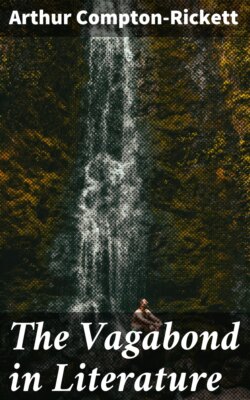The Vagabond in Literature

Реклама. ООО «ЛитРес», ИНН: 7719571260.
Оглавление
Arthur Compton-Rickett. The Vagabond in Literature
The Vagabond in Literature
Table of Contents
FOREWORD
INTRODUCTION. the vagabond element in modern literature
I
II
III
IV
V
VI
VII
I. WILLIAM HAZLITT
I
II
III
IV
V
II. THOMAS DE QUINCEY
I
II
III
IV
V
III. GEORGE BORROW
I
II
III
IV
IV. HENRY D. THOREAU
I
II
III
IV
V. ROBERT LOUIS STEVENSON
I
II
III
IV
V
VI
VI. RICHARD JEFFERIES
I
II
III
IV
V
VII. WALT WHITMAN
I
II
III
IV
BIBLIOGRAPHICAL NOTES
SOME PRESS APPRECIATIONS. of “PERSONAL FORCES. IN MODERN LITERATURE”
Footnotes
Отрывок из книги
Arthur Compton-Rickett
Published by Good Press, 2021
.....
Whitman seems at first sight an exception. Surely here was a friendly man if ever there was one. Yet an examination of his life and writings will compel us to realize a lack of deep personal feeling in the man. He loves the People rather than the people. Anyone who will go along with him is a welcome comrade. This catholic spirit of friendliness is delightful and attractive in many ways, but it has its drawbacks; it is not possible perhaps to have both extensity and intensity of emotion. There is the impartial friendliness of the wind and sun about his salutations. He loves all men—because they are a part of Nature; but it is the common human element in men and women themselves that attracts him. There was less of the Ishmaelite about Whitman than about Thoreau, Borrow, or Jefferies; but the man whose company he really delighted in was the “powerful, uneducated man”—the artisan and the mechanic. Those he loved best were those who had something of the elemental in their natures—those who lived nearest to the earth. Without denying for a moment that Whitman was capable of genuine affection, I cannot help feeling, from the impression left upon me by his writings, and by accounts given by those who knew him, that what I must call an absence of human passion—not necessarily affection—which seems to characterize more or less the Vagabond generally, may be detected in Whitman, no less than in Thoreau and Borrow. It would seem that the passion for the earth, which made them—to use one of Mr. Watts-Dunton’s happy phrases—“Children of the Open Air,” took the place of a passion for human kind.
In the papers dealing with these writers these points are discussed at greater length. For the present reference is made to them in order to illustrate the characteristics of the Vagabond temperament, and to vindicate my generic title.
.....